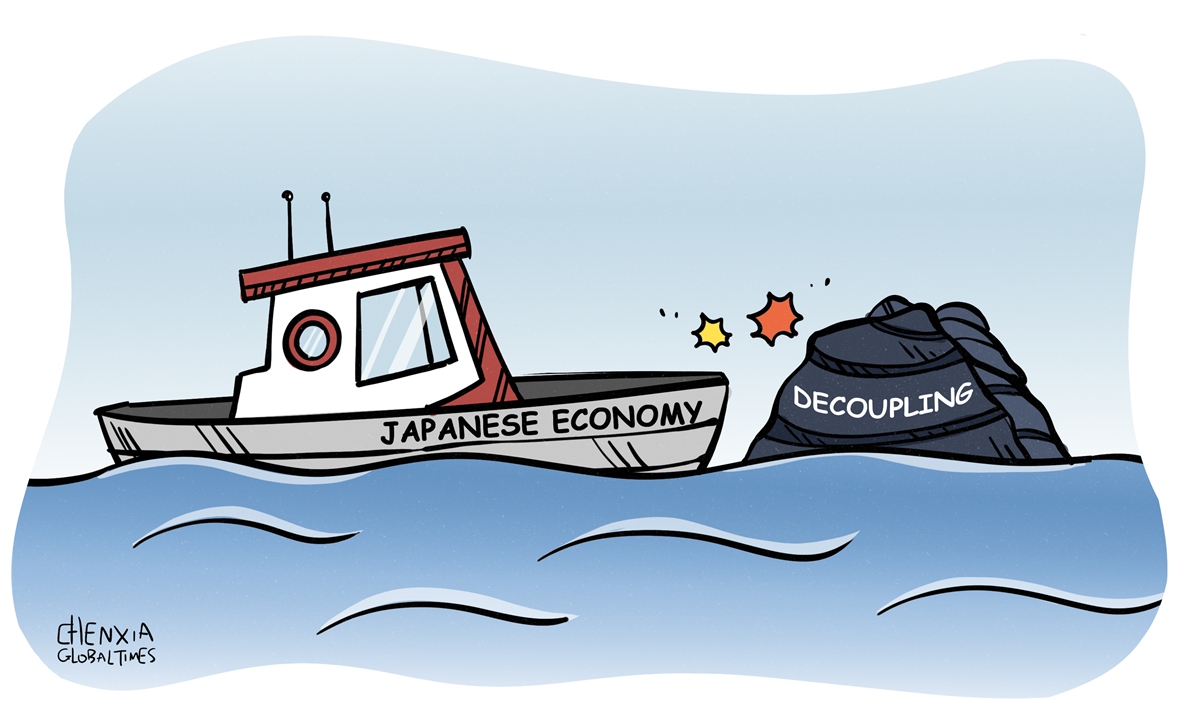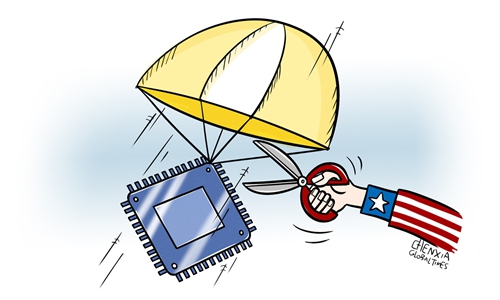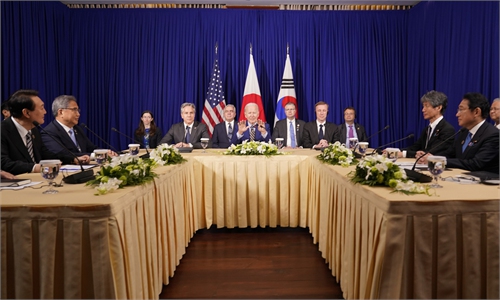
Illustration: Chen Xia/Global Times
Japan's economy contracted for the first time in a year in the third quarter, as inflation and the weak yen dampened private spending amid lingering impact of COVID-19. The country's adjusted real GDP in the July to September period shrank 0.3 percent from the previous quarter, which translates to annualized decline of 1.2 percent, according to data from the Cabinet Office, Nikkei Asia reported on Tuesday.Along with global economy slowing and inflation rising around the world, the unexpected contraction of the world's third largest economy demonstrates the multiple headwinds holding back its sluggish recovery and deserves full attention of economic policymakers in the country. At this critical juncture, Japan should be particularly careful about the serious implications of this rising decoupling tendency.
As the US has intensified its political interference in the normal economic, trade and industrial cooperation of its Asian allies in the geopolitical calculation of containing and besieging China, for some time, under the pressure of the US, Japan's economic and technological policies have tended to yield to the US' harmful decoupling campaign.
For instance, the Japanese parliament in May passed an economic security bill, which, according to the Japan Times at the time, is "primarily aimed at warding off risks from China." Obviously, once implemented, this legislation, which emphasizes reducing dependence on China's industrial chain and preventing key technologies from flowing into China, will have a serious impact on the mutually beneficial and complementary China-Japan economic and trade relationship.
Recently, as the US attempts to corral Japan and other Asia economies to join the so-called Chip 4 Alliance, there were media reports in Japan warning that cutting off imports from China would cost Japan $353 billion in lost production, or about 10 percent of annual GDP. If Japan allows its economic policy to be further affected by calls for decoupling, the outlook for the economy already under multiple pressures will undoubtedly become bleaker.
Analysts generally argue that Japan's unexpected economic contraction in the third quarter is mainly due to the weaken yen and rising inflation. Driven by the US Federal Reserve's aggressive interest rate hike and other factors, the Japanese currency yen has depreciated sharply against the US dollar in the past few months, severely impacting the Japanese economy.
Last month the yen hit a fresh 32-year low against the dollar, which has made the cost of imported goods - from oil to food - more expensive for Japan's households and businesses. People reined in spending amid fears of a global slowdown and as the weak yen made imports more expensive.
If Japanese economic policymakers want to resolve various risks and promote the steady recovery of the economy, they should actively promote economic and trade development with China and deepen integration into regional economic and trade cooperation, not the opposite.
For a long time, China and Japan have enjoyed highly complementary and close trade relationships. China has been Japan's largest trading partner for 15 consecutive years. Despite the impact of the COVID-19 pandemic, the total bilateral trade volume between China and Japan in 2021 remains at the high level of $371.4 billion. Boosted by the Regional Comprehensive Economic Partnership (RCEP), bilateral trade is expected to reach a new high this year.
During a virtual opening ceremony in September for a seminar to mark the 50th anniversary of the normalization of diplomatic ties between China and Japan, Chinese State Councilor and Foreign Minister Wang Yi noted that China and Japan should work together to reject the wrong practices of "decoupling or cutting off industrial and supply chains," keep global supply and industrial chains stable and smooth, and maintain a fair and open environment for trade and investment.
It is hoped that policymakers in Japan will seek to safeguard the hard-won results of economic and trade cooperation between the two sides, and be cautious toward decoupling and other dangerous trends that may derail bilateral mutually beneficial economic and trade cooperation.
The author is a reporter with the Global Times. bizopinion@globaltimes.com.cn



